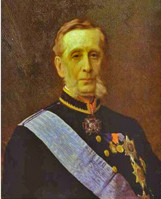
Birth of count Pyotr A. Valuyev, statesman, Minister of Interior of the Russian Empire
September 22 (October 4), 1814, was born a prominent politician, Minister of Internal Affairs of the Russian Empire, the chairman of the Committee of Ministers, Count Pyotr A. Valuyev.
Valuyev descended from an ancient noble family and received a good education at home. At the age of seventeen he joined the office of governor-general of Moscow. Passing an examination at the University of Moscow, Pyotr was promoted to the rank of provincial registrar and in 1834 transferred to serve in the II Department of HIH Office, where, under the command of M. M. Speransky worked on the codification of law. At the time, Valuyev entered the high life of Petersburg society, was in close contact with the brightest representatives of the "Golden Age" of Russian literature. According to some researchers, it was then that Valuyev became one of the prototypes of Peter Grinyov - the main hero of Pushkin's "The Captain's Daughter."
In 1845, Valuyev became official for special assignments under the Governor-General of Riga. In this position, Pyotr had worked well, and in 1853 was appointed governor of Courland. Impressed by the fall of Sevastopol and the defeat in the Crimean War, Pyotr wrote a note, "A thought of a Russian," in which he outlined his views on the reasons for the failure of Russia and the ways out of the crisis. The note was a great success at the highest levels of power and attracted attention, in particular, of the Grand Duke Konstantin Nikolaevich, who recommended it for the active study.
Valuyev outlined the main points of the reform of Russian society - the transformation of censorship policy, the promotion of self-employment, reform of departmental system. Valuyev had remained at the post of governor for five years, and was then appointed Director of the 2nd Department of the Ministry of State Property, which was headed by M. N. Muravyov. Pyotr’s service in the ministry coincided with the start of the elaboration of the Emancipation reform, to which he contributed a lot, remaining, in the meantime, the enemy of liberation of the peasants.
In January 1861, Valuyev was appointed Chancellor of the Committee of Ministers, and in the spring of that year became Minister of the Interior. His seven-year presence at the head of the most powerful agency signified skillful maneuvering between liberal-minded statements and reflection of the interests of conservatives. For this Pyotr earned from the liberal public the accurate epithet - "representative of the reaction in velvet gloves."
Valuev initiated the Zemstvo reform which prolonged statute labor system favorable to landlords and put local institutions in direct submission to the Ministry of Internal Affairs. Valuyev had also managed that censorship was in charge of his Office, which became the main weapon against the press and journalists objectionable. In 1863, he signed the famous "Valuyev Circular" - an order forbidding publication of religious, scientific and educational literature in the Ukrainian language. After the attempt of D. V. Karakozov at Alexander II in 1866, Valuyev turned to outright reaction. However, the growing public opinion against him and court intrigues led to the resignation of Pyotr Alexandrovich from the post of Minister of Internal Affairs in the spring of 1868.
A year later, Valuyev was appointed chairman of the Discount Bank, and entered the State Council. Pyotr Alexandrovich was one of the initiators of the introduction in Russia of the all-class conscription. In early 1872, Valuyev occupied the post of the Minister of State Property. He initiated a study of the position of agriculture and led the so-called Valuyev Commission dealing with these issues which published several volumes of works. In 1878, Pyotr was appointed chairman of the Committee of Ministers. In 1880, Valuyev was granted the title of Count. A year later, due to the identified numerous violations in the practice of distribution of state lands, he was dismissed from all his posts.
The last years of his life Valuyev devoted to literare. He wrote a number of novels and stories, and published several articles on religious themes. Pyotr Valuyev died on January 27 (February 8), 1890 in St. Petersburg at the age of 74.
Lit.: Валуев П. А. Письма к М. Т. Лорис-Меликову (1878-1880). М., 1991; Он же. Записка П. А. Валуева Александру II о проведении реформы 1861 г. // Исторический архив. 1961, № 1. Он же. Предложения и проекты П. А. Валуева по вопросам внутренней политики (1862-1866 гг.) // Исторический архив. 1958, № 1; Гетманский А. Э. П. А. Валуев о воспитании, школьном и высшем образовании. Тула, 2001; Секиринский С. С. Пётр Александрович Валуев // Российские консерваторы. М., 1997.
Based on the Presidential Library’s materials:

